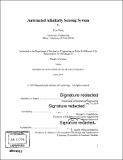Automated alkalinity sensing system
Author(s)
Wang, Yiou,S.M.Massachusetts Institute of Technology.
Download1119389014-MIT.pdf (3.728Mb)
Other Contributors
Massachusetts Institute of Technology. Department of Mechanical Engineering.
Advisor
Michael S Triantafyllou.
Terms of use
Metadata
Show full item recordAbstract
Ocean Acidification is a reduction in pH caused by the absorption of atmospheric CO2. Low pH decreases the availability of calcium carbonate to shell and skeleton secreting marine animals such as mollusks and corals reducing their growth rates and even causing death. Thus, monitoring oceanic conditions has become more and more important, in particular there is a need for extensive measurements of carbonate chemistry parameters over both space and time. This paper presents a low-cost, automated benchtop measuring system for total alkalinity, one of the important parameters for monitoring marine carbonate chemistry. This system addresses the need for a low-cost alkalinity sensing system that can be deployed in great numbers to provide the large data sets needed for to measure and predict the impact of ocean acidification on the marine ecosystem. It is based on a two-point acid titration method. Tests of the prototype have shown that the system gives acceptable results comparable to manual measurements. With hermetic repackaging, the system could be field deployed on platforms such as AUVs or buoys.
Description
Thesis: S.M., Massachusetts Institute of Technology, Department of Mechanical Engineering, 2019 Cataloged from PDF version of thesis. Includes bibliographical references (pages 36-38).
Date issued
2019Department
Massachusetts Institute of Technology. Department of Mechanical EngineeringPublisher
Massachusetts Institute of Technology
Keywords
Mechanical Engineering.